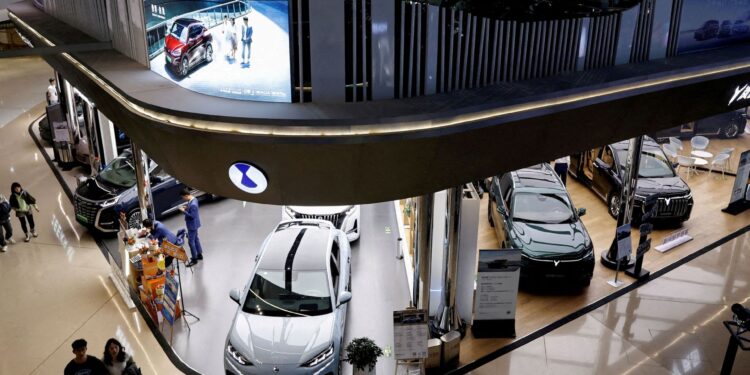The electric car sector is heading to be the subject of a new confrontation between China and Western countries through competition to win the largest part of this sector, which has developed significantly over the last decade.
In the coming weeks, the European Union and the United States are expected to witness the entry of a Chinese-made electric car, at a price not exceeding $20,000.
The new car manufactured by the Chinese company BYD is called “Seagull”, and its value in the Chinese market is only 10 thousand dollars. It is a vehicle that will widen the door to the sharp trade disputes between Europe and the United States on the one hand, and China on the other. Other.
In 2023, BYD will have the highest sales of electric cars around the world with 3 million cars, according to its official data, surpassing Tesla, which sold 1.8 million cars during the same period.
BYD is at the forefront of Chinese automakers that are increasingly targeting exports after controlling their domestic market.
Sound the alarm
Last January, Tesla CEO Elon Musk warned that the Chinese would largely demolish most other automakers if trade barriers were not erected.
Seagal was not alone in the issue that is troubling the West and the car giants there, as the Chinese car industry is witnessing great development, with prices lower than the cost of production of its counterparts in Europe and the United States.
The electric car industry has turned into an expanding arena of conflict between China and the West, due to European accusations that the Chinese government supports electric car companies and thus has the ability to produce cheap vehicles.
By next June 5, the results of a European investigation that began last year will be issued regarding the possibility of Chinese car companies receiving government support, which the bloc sees as exceeding the limits of competition.
China anticipates the European decision
However, Bloomberg said in a report that China anticipated the upcoming European decision, and announced a plan to impose a 25% tax on European and American vehicles with large engines sold in its markets. This was confirmed by a publication on the X platform, issued by the Chinese Chamber of Commerce to the European Union.
If the results of the investigation are issued confirming the presence of Chinese support, the Chinese Chamber of Commerce with the European Union believes that the bloc will impose a tax on cars coming from China.
The market for large-engine cars coming from Europe and the United States to China amounts to about 250,000 cars annually.
But in contrast, the number of Chinese electric cars sold in the European Union and America is about 700,000 cars annually, according to data from the Chinese Customs Authority.
Last week, the White House announced that President Joe Biden would sign a resolution raising the tax on the Chinese auto industry, to 100%.
World automobile industry
Over the past ten years, China has turned into a destination for international car companies, especially those active in the electric vehicle industry.
Tesla, for example, has one of its largest car factories in China, and is trying to establish its footing in the Chinese local markets, which has a population of 1.4 billion people.
Also, European and American companies have manufacturing or assembly centers in China, such as the German company Volkswagen, BMW, Mercedes, Volvo and Audi, which shows China’s weight in the global automobile industry, according to the Chinese Ministry of Commerce.
Tension mounts
Trade tensions between the European Union and China have escalated since the investigation into electric cars was announced last year.
President Xi Jinping’s visit to Europe this month appears to have done little to ease tensions.
In a statement on Tuesday, Eurasia Group analysts wrote in a note published on the group’s website that the investigations and retaliatory trade warnings threatened by China will not deter the European Union.
They added that Brussels is keen to send a strong signal to Beijing through its investigation into electric cars that the EU will address Chinese subsidies and excess capacity.



